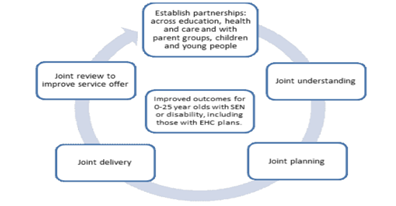What is integrated commissioning for SEND?
Integrated commissioning for SEND is when partners come together to commission services which are then provided across the system for service users with additional education, health and or care needs (EHC).
The two lead commissioning organisations in Lincolnshire are LCC and Lincolnshire’s ICB; working in partnership to actively seek opportunities to jointly commission services where there is benefit.
Organisations may retain their own commissioning responsibility and may operate to different commissioning rules, but they can consider sharing resources to develop a comprehensive, consistent approach to understanding needs, agreeing priorities, designing, procuring, monitoring, and managing the performance and quality of services.
Co-production with CYP and their families, alongside meaningful consultation with schools and providers from across the system, is critical in creating effective integrated solutions. This shared commitment reduces duplication of services and resource, promoting jointly agreed priorities ensuring the most effective use of public funds, services and support for CYP and their families.
The commissioning cycle as set out in the SEND code of practice has five clear stages that structure how local partners should commission services to meet local needs and support better outcomes.

The five stages on how partners should commission services are:
establish partnerships: across education, health and care and with parent groups, children and young people
- joint understanding
- joint planning
- joint delivery
- joint review to improve service offer
The cycle through its simple structure helps guide how partners should develop a joint understanding of the outcomes that their local population of CYP with SEND aspires to.

